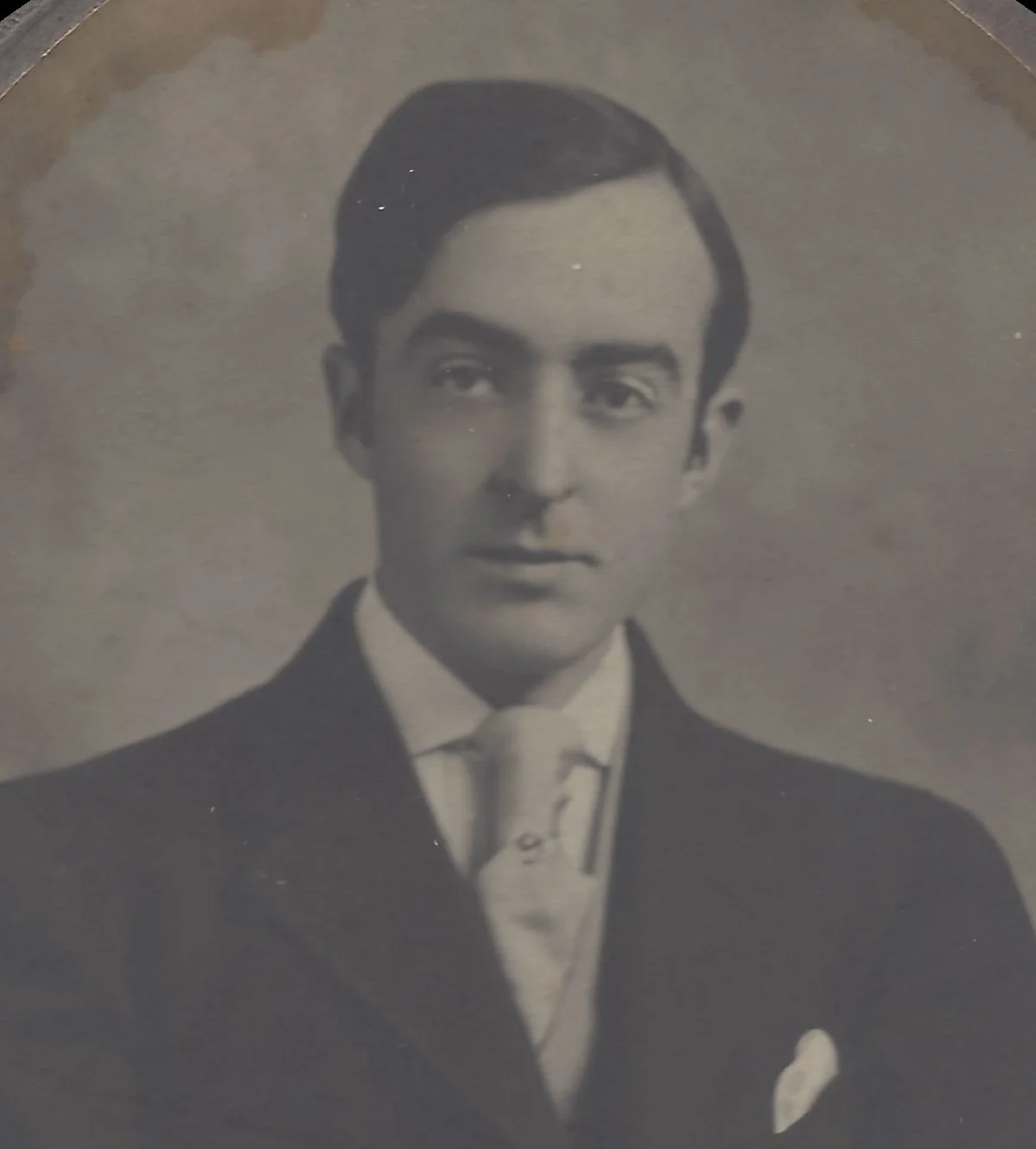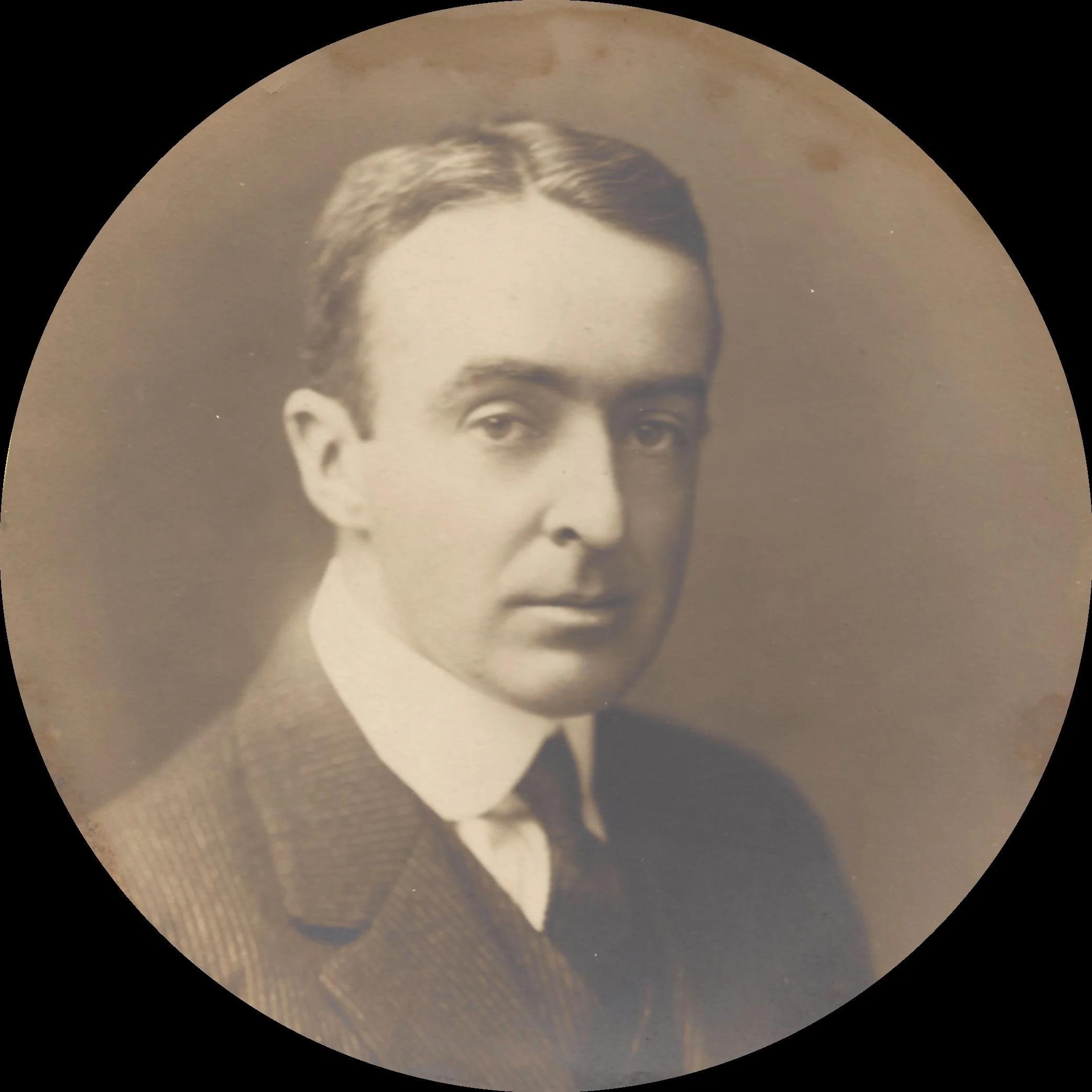A Tale of Two Heists
This month, Matthew T. Page and Samantha Miller share the story of William Weeks, a local benefactor and enigmatic figure whose Winter Street home was the scene of two headline-grabbing robberies. Note that this story contains details that some readers may find unsettling.
Longtime residents of North Reading will know the name William Weeks—the namesake of the town’s library when it operated in the Damon Tavern (1958-1991). Weeks was an enigmatic man who left his fortune to his beloved home town upon his death in 1944. The source of that fortune is equally mysterious—as are a series of deadly events that happened at his beautiful Georgian home on Winter Street in October 1913.
Who Was William Weeks?
Born in 1877, William was the only child (likely adopted) of Mary and Seymour Weeks of North Reading. As a schoolboy, young William’s father Seymour—perhaps a sailor or fisherman by trade—was tragically lost at sea.
William Weeks (top row, far right) pictured with North Reading school classmates c.1890 (NRH&AS Collection)
After graduating from local schools, William tried his hand at farming before going into real estate, according to census data. However, there is information to suggest that William’s mother Mary owned a hotel in Boston that catered to actors and theatergoers. It is also rumored Mary operated a brothel and that William’s birth mother was one of her workers.
Whatever the truth, Mary Weeks maintained a standard of living far greater than the vast majority of North Reading residents at the time. It is clear she operated some sort of business, as William’s 1918 draft card lists his mother as his employer. And another clue suggests Mary earned more than your average sailor’s widow: in 1929, the Boston Globe reported that William had lost a gold and three-stone diamond ring that had been a gift from his mother.
William Weeks as a young man (NRH&AS Collection).
An Uninvited Guest
The Weeks’ relative wealth may explain why—on October 11, 1913—someone they knew attempted to murder and rob 68 year-old Mary in their Winter Street home. In her own words, here is what happened:
“Last evening, I was in my kitchen ironing. Willie had left the house. Suddenly I was impressed that there was someone beside myself in the room, and turning I saw Dr. [Sven] Wiberg of Reading. Up to last spring I had been a patient of his for massage.
I was startled to see him standing there, for on all previous calls he had come to the front door and waited to be admitted. We spoke and on my asking him his business, he asked if I had any eggs. I told him I had not and then he asked to get him a drink of water.
I turned toward the pantry door to draw the water and the next thing I knew I received a savage blow on the head. Involuntarily my hand went to my head as a means of protection and the blows continued to fall.
I turned and grappled with him and succeeded in wrenching from his hand his weapon, which proved to be a piece of lead pipe. I not only got it away from him, but I hit him with it at least once, retreating as I did so to the shed off the kitchen.
Thinking to mislead him, I fell upon the shed floor as if unconscious. The ruse worked nicely for after peering into my face, the doctor turned and rushed back toward the front of the house interior. I scrambled to my feet and running from the house, screamed for help. I reached the home of Robert M. Blair nearby and from there was taken to Dr. E. D. Richmond’s office in Reading.”
The Weeks’ home at 5 Winter Street, c. 1880.
Then, something even more bizarre happened. Wiberg was fatally shot. The Boston Globe continues the story:
“[The local doctor] believes that Wiberg, after going to the main part of the house, returned to the shed, and, finding Mrs. Weeks gone, and probably hearing her screams for help, realized the probability of his being quickly discovered, and in trying to make a hasty getaway stumbled a fell, with the almost immediate and accidental discharge of the pistol.”
But why did Dr. Wiberg—a married Swedish-born physician and father of two young children—attempt to murder and rob someone he knew so well? And why, after attacking Mary Weeks with a lead pipe, did he “accidentally” shoot himself, according to his death certificate, straight through the heart?
Sven Wiberg’s death certificate. It notes that his cause of death was “a bullet wound through the heart. Probably accidental.”
Readers can decide if explanations provided at the time—chronicled in the Boston Globe—satisfactorily answer these questions:
“[North Reading] Chief of Police Croswell called today at Dr Wiberg’s home on West Street in Reading, and interviewed his wife. Mrs Wiberg said that her husband had owned the automatic pistol, found beside his body, for five years. She also said he had been working on some pieces of pipe for several days, but she understood they were for the repair of a pump.
In corroboration of the police theory that Dr Wiberg intended to rob the Weeks’ home Mrs Wiberg admitted that for a year he had been in financial difficulties, that he wanted to pay his obligations promptly, and his inability to do this had made him very nervous and depressed.
According to her statement made to the chief, he had a note of $300 [about $10,000 in 2025 dollars] that would fall due next Friday. He knew of no way to meet this debt and for several days Mrs Wiberg said he had been acting queerly.”
Did William Weeks or someone else interrupt the robbery and shoot Dr Wiberg with his gun or their own? Or did he really stumble, fall, and accidentally shoot himself directly in the heart? Or fearing capture, did he kill himself? And if so, why did he fire at his chest and not at his head? And why did Dr Wiberg believe that he could obtain a huge sum of money by killing an elderly widow living in a small farming community? To this day, nobody knows.
A Second Robbery
After recovering from the attack, Mary Weeks lived for another eleven years, passing away in 1924. William—who never married—continued to live in her spacious house on Winter Street along with his housekeeper Mary Thompson.
Involved in real estate, insurance, and finance, Weeks was one of North Reading’s wealthiest residents and one of the first locals to own an automobile. Impeccably dressed (he was especially fond of wearing spats), he also enjoyed trotting around town on his Tennessee walking horse. By 1940, Weeks was semi-retired, earning $2,800 a year ($65,000 in 2025 dollars) as a bank director.
Perhaps enticed by his well-known wealth, armed robbers attacked Weeks’ Winter Street home for a second time in 1941. On April 2nd that year, two masked gunmen forced their way into his home while he was out, terrorizing his housekeeper. According to the Boston Globe:
“[Mary Thompson] said two masked gunmen forced their way into her Winter Street home at 5 p.m., bound and gagged her with silk stockings and then fled with $4275 [$94,000 in 2025 dollars] in jewelry and cash taken from a small safe…[They] took $275 in cash, a diamond ring valued at $2000, a three-carat diamond ring valued at $1000 and two other rings she said were worth $500 each.”
“I was baking bread when I heard the doorbell ring,” Miss Thompson, administratrix of the estate, declared. “When I opened the door there stood two men. One of them wore a black mask and the other wore a white one.”
“They told me they wanted money,” she told the police. “One of them told me to sit in a chair. He held a gun at my head while the other looked around. He found the safe in the pantry. They asked me the combination and while I was telling them, the man with the gun hit me with his hand.”
“Then he tied my arms to the side of the chair with my silk stockings,” she said. “After that he tied my ankles to the legs of the chair and then gagged me with another stocking.”
After rifling the safe, one of the pair ransacked the lower floor of the 2½-story colonial home, she declared, and then they fled after pulling the telephone wires from the wall.
Miss Thompson said she “edged the chair over to the kitchen stove about four feet away, and I managed to reach a pair of scissors on the stove.”
“I cut the stockings loose and then ran into the street where I saw Harold Richardson” (a neighbor who called the State Police), she told investigators. State Police detectives said she told them the two gunmen sped away in a “black sedan.”
History does not record how Weeks reacted to this second robbery or whether the gunmen were ever caught.
Three years later, he passed away, leaving $40,000 (nearly $1 million in 2025 dollars) to establish what he called “a library for the free use of the inhabitants of the Town of North Reading.” Town leaders opted to use the entirety of William Weeks’ bequest to buy the Damon Tavern on Bow Street from the Whitcomb family.
William Weeks in his prime (NRH&AS Collection).
The town’s collection of books—acquired as a gift from Harriet Flint—was moved over from the overcrowded Flint Memorial Hall, home to the town’s administrative offices.
The Weeks Memorial Library
The Weeks Memorial Library opened in 1958 and operated in the Damon Tavern until the mid-1980s, when its collection began to outgrow the space and it became clear that structural problems dating from a botched 1957 renovation had made the building unsafe. At that point the town decided to renovate and convert the Flint Memorial Hall into a modern library.
Story time in the library, c. 1961.
In 1991, the Flint collection moved back across the street and the Weeks Memorial Library effectively ceased to exist.
As the Flint Memorial Library marks its 150th anniversary this year (with celebrations planned in early 2026), it is important to remember how William Weeks’ generosity fits into its story and the preservation of the Damon Tavern. Without his gift, North Reading may have lost the well-preserved early nineteenth century coaching inn that has become a focal point of its beautiful historic district.
It is also worth remembering William Weeks as one of North Reading larger-than-life historic characters, someone whose origin story and professional career are as mysterious as the headline-grabbing heists that happened at his Winter Street home.
Do you have memories or photographs to share about the Weeks Memorial Library? If so, please share them with us at: info@nreadinghistory.org.








